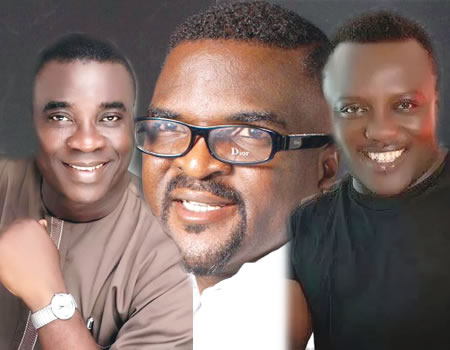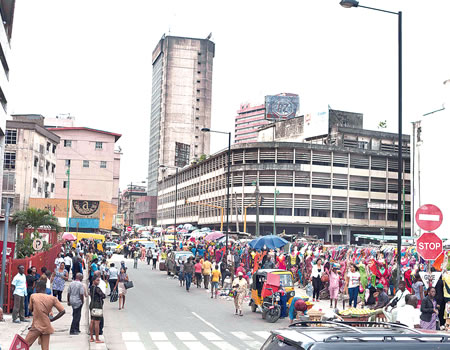Lagos remains one of the central points to both the political and commercial evolution of Nigeria. As significant as that is, Lagos Island which is an integral part of the city-state, has grown to enjoy both a reputation and an attraction to many for within it has emerged a rare fusion of Fuji music, various cuisines and diverse cultures. TUNDE BUSARI, who visited that section of Lagos, writes on this fine mix.
Following both the industrial and commercial evolution of Lagos State through the years, there has been a growing blend of different cultures which daily plays out but one of the unique settings that such blend has enjoyed such pronouncement is Lagos Island.
What today is regarded as Lagos Island includes Eko Atlantic City, Ikoyi, Banana Island, Lekki Peninsula, Onikan, Marina, Obalende and Victoria Island. Today, Lagos Island is held as home to, not just the state’s elite, the rich socialites, business tycoons and headquarters of some of the many successful corporations in the country.
For its unique location and the various attractions, Lagos Island remains one of the dream locale for many to live in. Highly regarded for its luxury apartments and seen as the hub of commerce, Lagos Island compares largely with many other first world cities.
Speaking with Nigerian Tribune, Chika Emenike who lives at Victoria Island stated that “It is quite expensive to live here but it is worth it. There are many things that make the place attractive. Unlike in many other parts of Lagos, the crime rate here is much reduced. In fact, you can be rest assured that this is the place to stay.”
For Lekan Ogunmiloro, an Ajah resident, Lagos Island compares to none other. According to him, “there are many things that will make you get attracted to the place. The structures are not only beautiful, people do not just wake up to erect buildings indiscriminately.
“I must also say that leisure time here is wonderful. People find relaxation time a fantastic opportunity to connect with friends and associates.”
Historically Lagos Island otherwise referred to as Isale Eko played host to many of the Brazilian returnees after the slave trade era. Since trade was pivotal to the coastal trip and the need to settle the new slave returnees, it became quite convenient for various cultures, cuisines and other rare blends of music to evolve. Among others, samba, a Brazilian music genre, enjoyed much attention there.

Another very unique music genre of Yoruba extraction which has been enjoying much acceptance on Lagos Island and which is noticeably played at various for a and merry-making platforms is Fuji music
Lagos, Fuji: An inexplicable bond
Lagos is a central part of the South-West zone which today is regarded as the entertainment hub of the West African sub-region. This is based on the number of musicians as well as performing and creative artists that have over the years emerged from the area.
One genre of music that earned the zone that reputation is Fuji, which since invention in the 70s has taken off street elements that could have become public liability.
Fuji provided employment opportunity to many, such as singers, back-up vocalists, percussionists and many others. Like a hurricane, Fuji took on other older genres like Sakara, Apala, High Life, Juju, and pushed some of them to the rear, in terms of patronage and spread among old and young music lovers.
Were, which is performed by Muslim youths during the nights of the month of Ramadan in the neighborhoods,is the forerunner of Fuji and also a stepping stone that aided Barrister and others to find their feet in the entertainment stage.
Notable names of Were singers,especially in Lagos included Kawu Aminu, Raimi Ogidan, Sakariyau Olaigbade, KasaliAlani, Abinuwaye Ganiyu, Ayinla Yekinni, Ayinde Muniru, Taye Aileru, KarimotAnifowose, AyinlaRasak, IsiakaIyanda. There were others like Dauda Akanmu Epo Akara, Ganiyu Kuti and others in Ibadan. They all made mark as Ajiwere in the 50s and 60s.
Nigerian Tribune gathered that not all the Were acts got fused into Fuji music. Some like Saka Olaigbade embraced Sakara while Dauda Akanmu Epo Akara carved what he called Awurebe out as a distinct indigenous genre.
Wikipedia, a free online encyclopedia, created and edited by volunteers around the world and hosted by the Wikimedia Foundation, refers to Fuji as a music genre from Yoruba land of Nigeria.
The attraction to that genre has been very fascinating through the years as the younger generation of music lovers and singers has continuously displayed their love for it.
Within the Lagos metropolis and other parts of the South West, chief among the popular Fuji musicians in Nigeria include the late Dr Sikiru Ayinde Barrister, Alhaji Ayinla Kolington, Alhaji Wasiu Ayinde Marshal, Adewale Ayuba, Abass Akande Obesere, Saheed Osupa, Wasiu Alabi, Muri Alabi Thunder, Sulaimon Alao Malaika, Adewale Akanji Barryshokey, Shefiu Adekunle Alao, Sule Adio, Wasiu Ajani, Taiye Currency, Alhaji Komi Jackson and Shina Akanni.
Within the genre also is a growing desirability by a much younger generation. Fuji singing kids include Konkolo Wally G, Wasiu Container, Shankoo Rasheed and Muri Ikoko. They are doing well within the industry.
Today, fuji music has continued to attract younger generations; there are now over 10 fuji singing kids (such as Shanko Rasheed, Wasiu Container, Konkolo Wally G, Global T, and Muri Ikoko) who are doing well in the industry.
With the rise and continued rise of Fuji music across South west and the nation, one of the most pressing issue is the sustenance of the genre which is today seen as a movement, a religion and a way of life.
It will be difficult to separate Lagos Island from Fuji music —Lagos chief
The Otun Mayegun of Lagos, Alhaji Adekunle Alli was born and bred at Lagos Island. He was a member of the House of Representatives in the second republic. He speaks with TUNDE BUSARI about the relationship between Lagos Island and Fuji music.
What is the position of Lagos Island in the social development of Lagos and the South-west states?
The position of Lagos Island in that respect is even beyond the South-west because Lagos Island is a place where everybody wants to be. It is a settlement where people from different ethnic groups converged to trade and even settle. Because of this, we have over the years witnessed infusion of different cultures.

For instance, the Brazilian quarter is there where the returnees settled. It may also be of interest that some Kanuri people have come and integrated into the environment. This place is open for hardworking people and many of them have been prosperous. Trading is the base of our economy. Come here with nothing, you return home with something.
How is the social life of Lagos Island people?
The social life here is incomparable in the true sense of the word. I just told you the composition of the people. This means we have varieties, in terms of social activities.
Fuji music is said to be popular here. Can you confirm this sir?
Fuji music is popular but Sakara is more popular. You are reminding me of the late Abibu Oluwa. Sakara was so popular that it was the choice of the old and young. Fuji came later through Were. I can tell you that Lagos Island produced Ajiweres like Kawu Aminu who is my friend.
I have heard about Kawu Aminu from the late Dr Sikiru Ayinde Barrister. Is he still alive?
I think he is alive. The only problem is that it has been a long time we saw each other. I am sure he is alive.
How did Fuji evolve from Were and who can be credited to it?
Were did not change to Fuji just like that. I think Fuji is like a movement. Some Were singers moved back to Sakara while others moved forward to Fuji.
Who then is the creator of fuji?
I said it was a movement. So I cannot say specifically who created it because we had many of them around then.
The late Dr Sikiru Ayinde Barrister is acclaimed to be the creator of the genre. How true or otherwise is this?
That is where the problem is. Barrister may have experimented and others followed. There is no doubt that he was the most acknowledged among Fuji musicians. But he should not have proclaimed himself. He should have allowed the listeners to do that for him. I think that is where the problem lies.
Does fuji carry the same meaning as fuja and faaji?
Fuji is not our word. Faaji also came from Hausa language. It means pleasure. Only Fuja is our word, which means that somebody is prosperous.
WATCH TOP VIDEOS FROM NIGERIAN TRIBUNE TV
- Relationship Hangout: Public vs Private Proposals – Which Truly Wins in Love?
- “No” Is a Complete Sentence: Why You Should Stop Feeling Guilty
- Relationship Hangout: Friendship Talk 2025 – How to Be a Good Friend & Big Questions on Friendship
- Police Overpower Armed Robbers in Ibadan After Fierce Struggle






